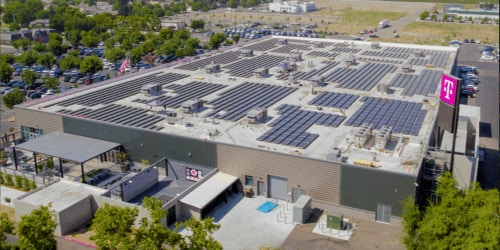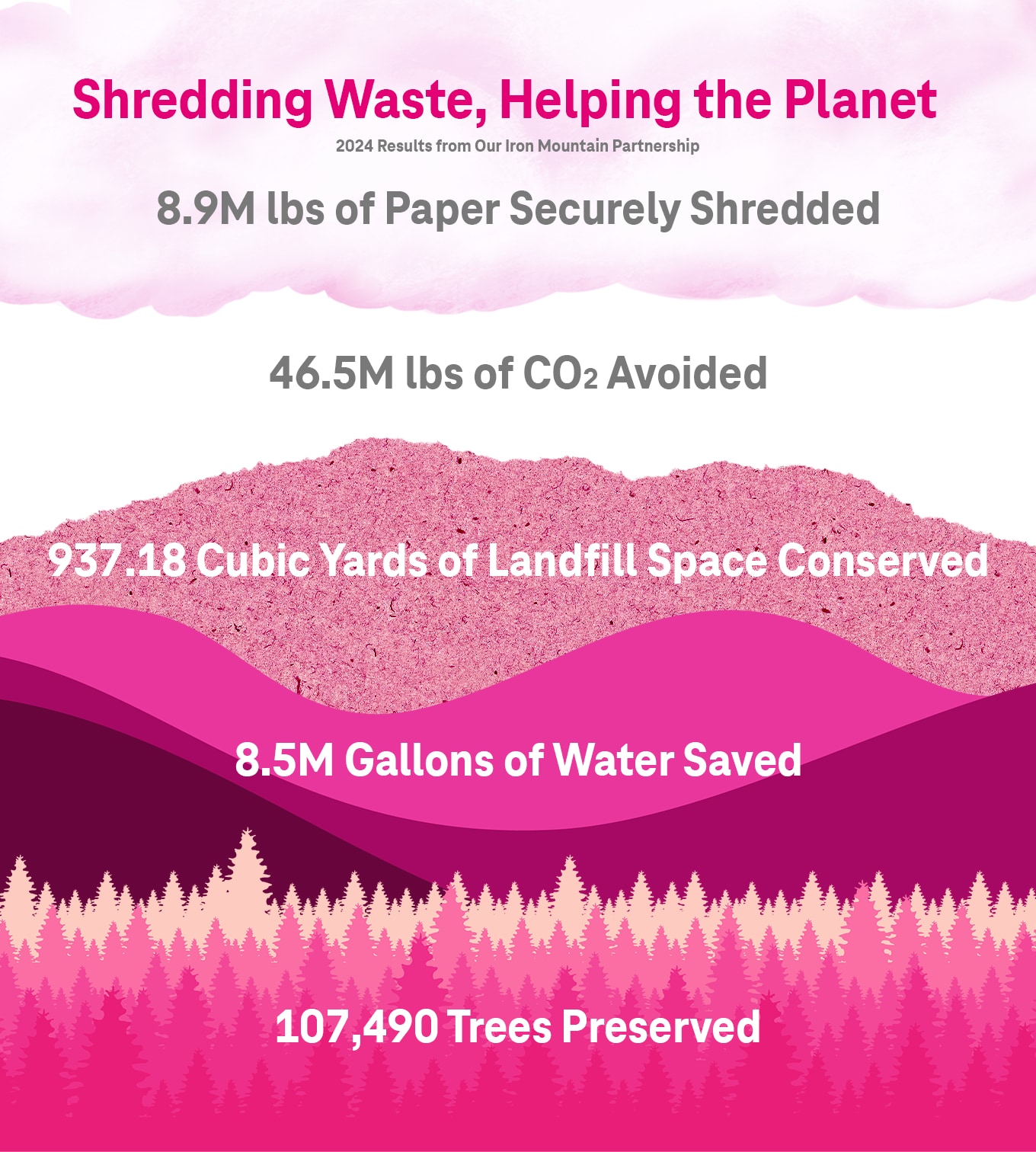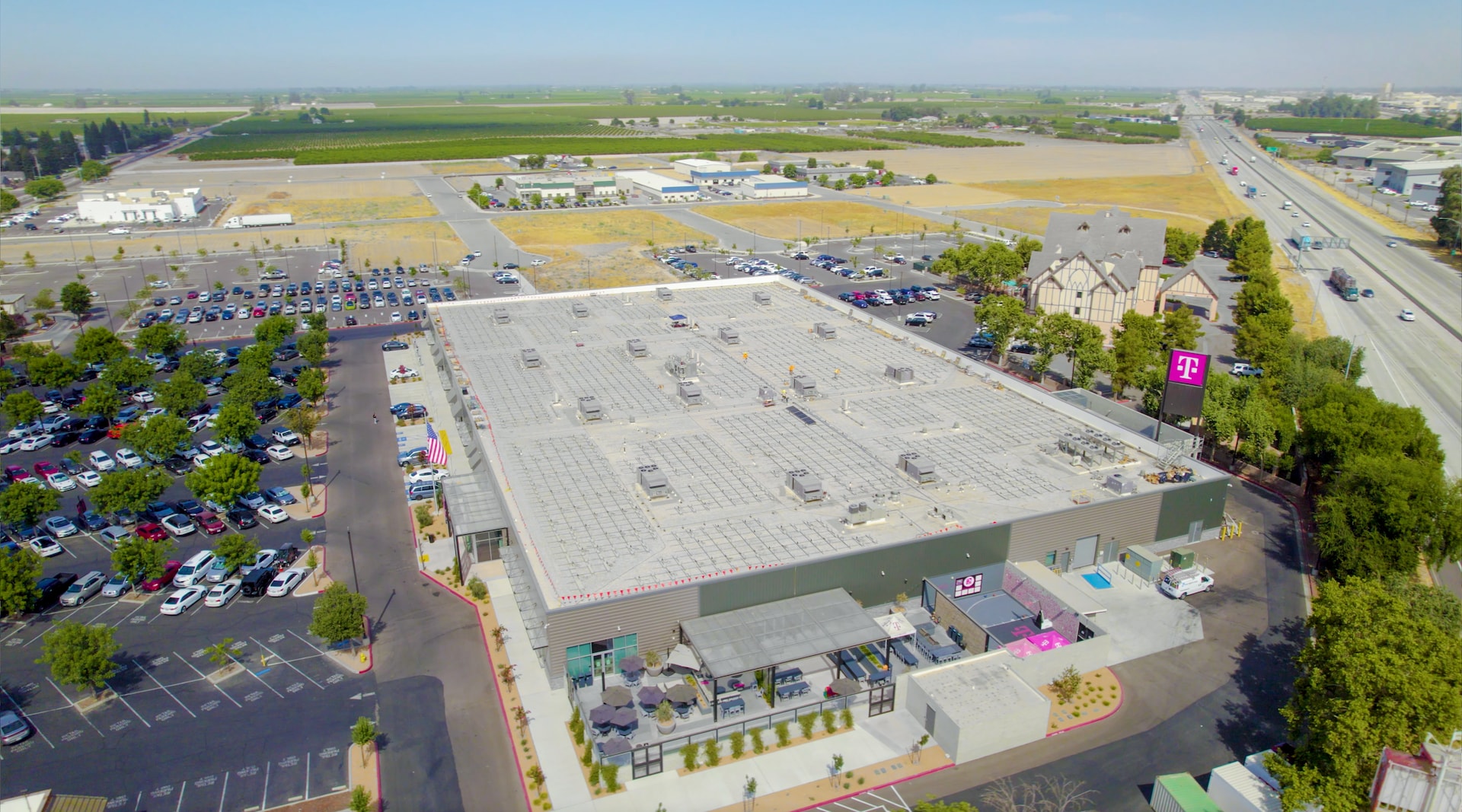The People Behind the Progress
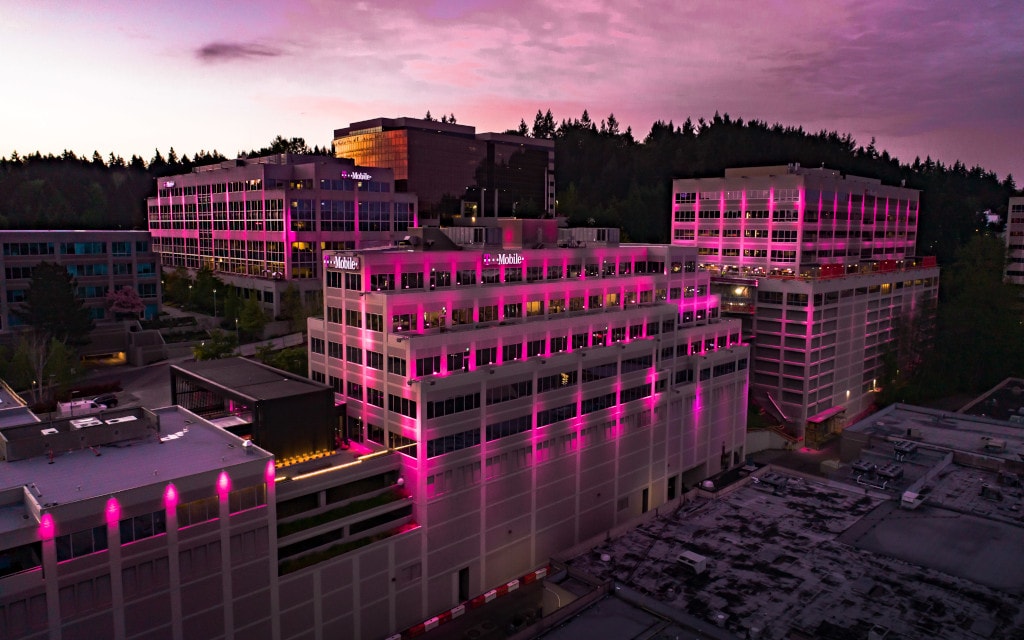
How T-Mobile Is Building a More Resilient Future
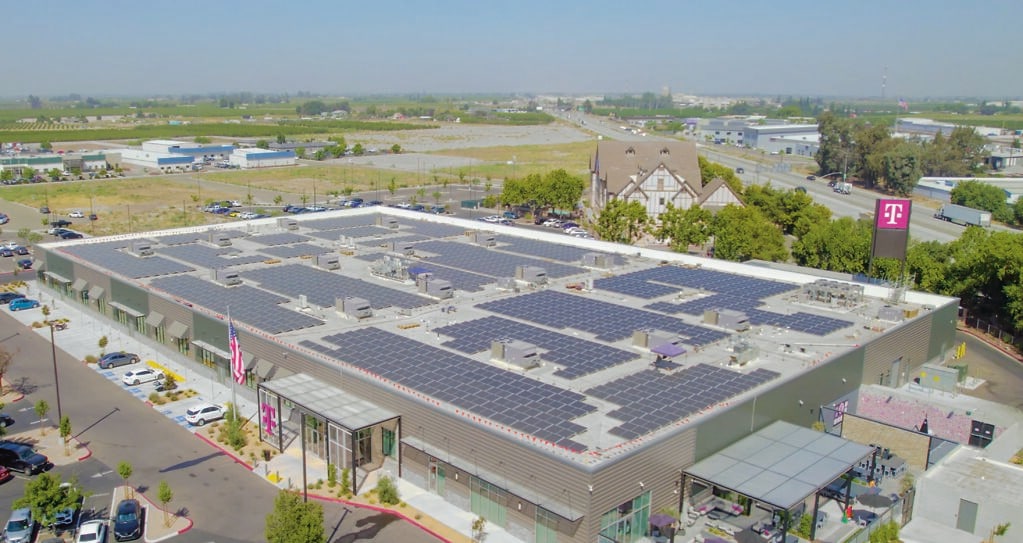
By T-Mobile Stories
T-Mobile is reimagining how a business can grow responsibly, efficiently — and with long-term resilience in mind.
The Un-carrier has pledged to reach net-zero carbon emissions by 2040 by sourcing 100% of its electricity from renewable energy — setting a bold standard in the telecom industry. Since 2020, this vision has resulted in a 33% reduction in total carbon emissions, thanks to a combination of renewable energy sourcing and major energy efficiency upgrades.
By combining innovative thinking with operational discipline, the Un-carrier is taking steps to build a more sustainable future.
For example, T-Mobile has achieved a 73% reduction in energy consumption per petabyte of data since 2019, and its industry-leading 5G network has become more efficient year over year. Improvements in cooling and data center operations have led to an 11% decrease in energy use. With a target to achieve a 95% reduction by 2030, the company is setting the pace.
Sustainability isn’t just a goal — it’s built into how T-Mobile operates and drives value for its business. From smart thermostats and ENERGY STAR lighting to rigorous refurbishment programs for devices, the Un-Carrier is making innovative changes to how it’s harnessing the power of 5G technology solutions, in order to support more sustainable growth. To guide this work, T-Mobile has set out to achieve net-zero emissions across its entire carbon footprint by 2040 — a U.S. wireless industry first. T-Mobile is also a proud participant in global sustainability movements like The Climate Pledge and RE100.
But these numbers only tell part of the story. What makes the impact real is the people who make it possible. And this is their story.
Table of Contents
Chapter 1
A Headquarters Ahead of the Curve
Chapter 2
Harnessing the Sun at Kingsburg
Chapter 3
The Power of Reverse Logistics
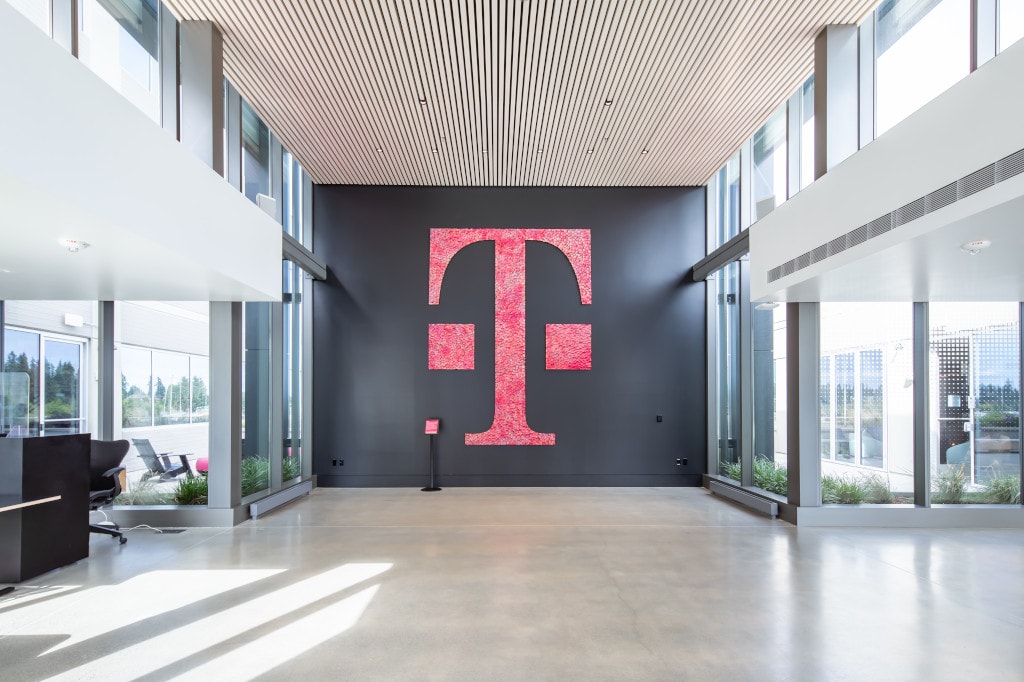


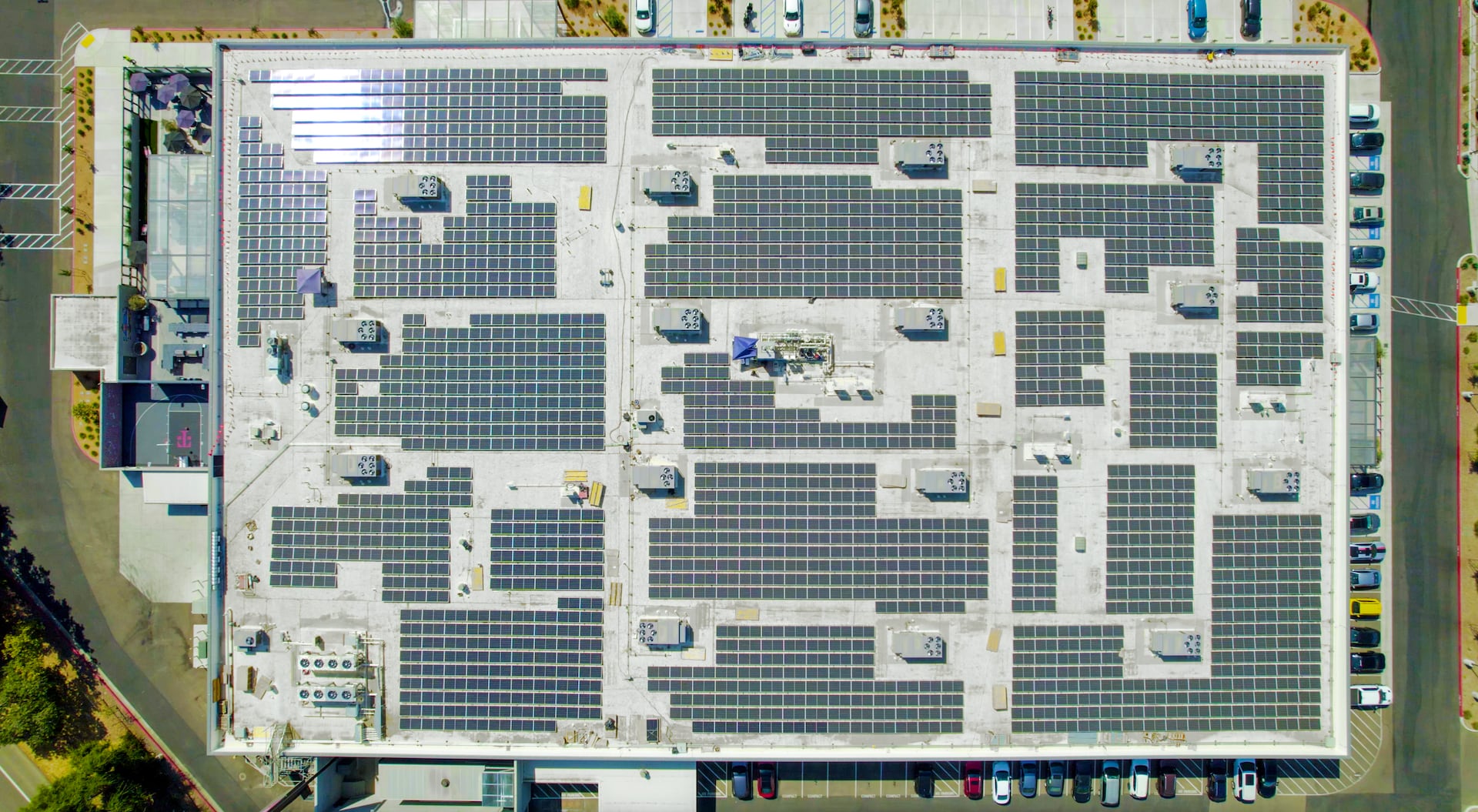

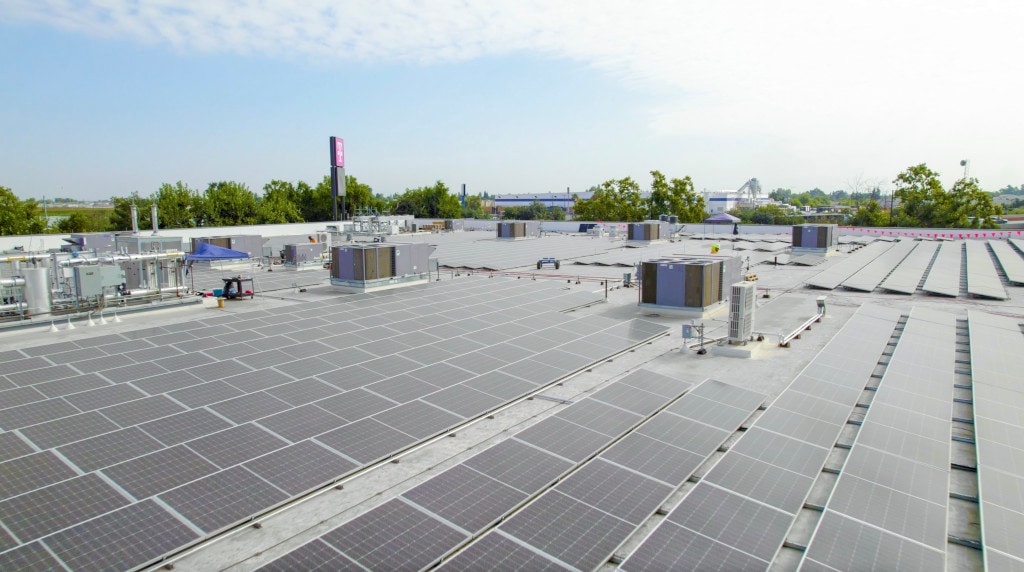
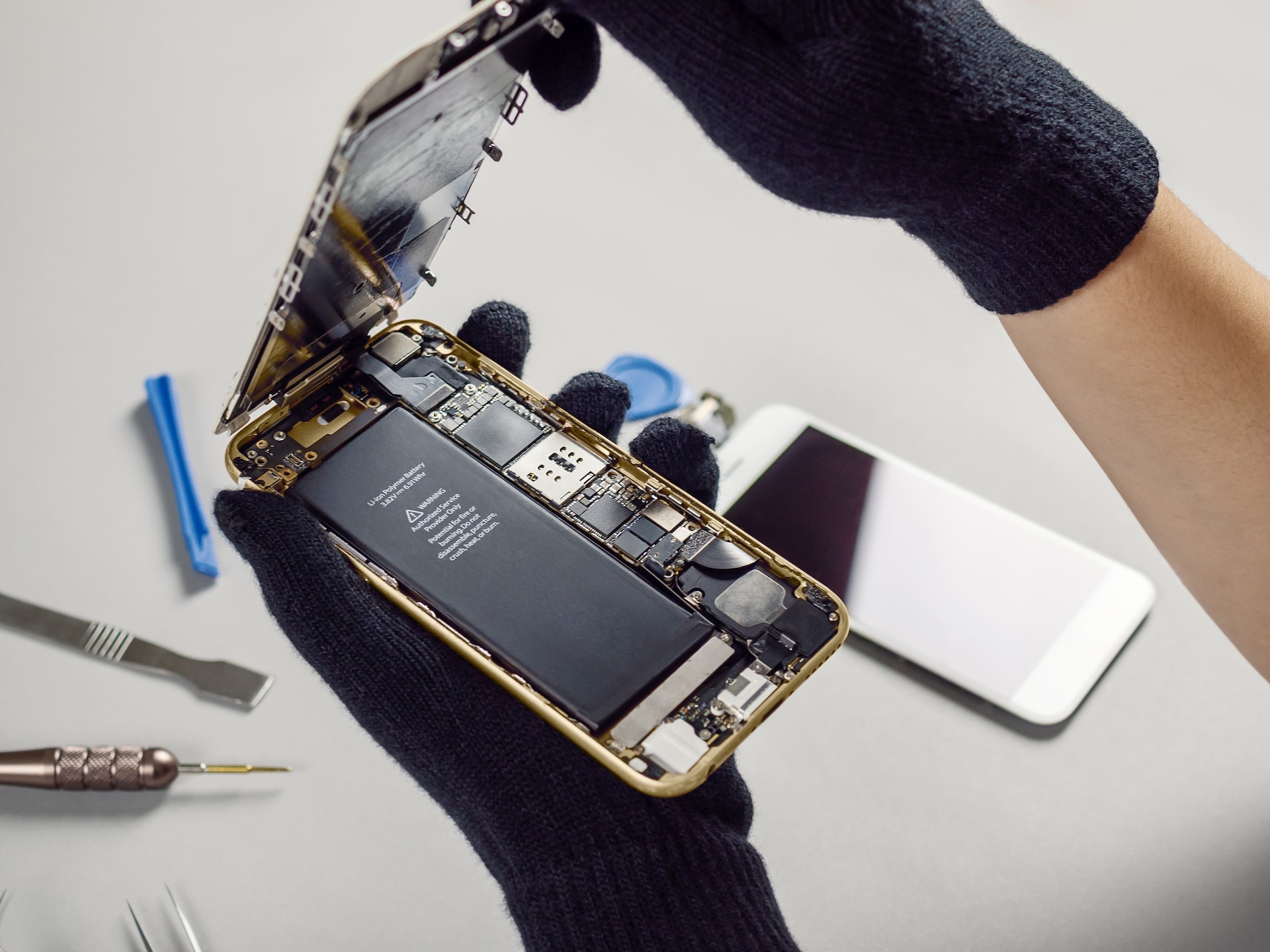
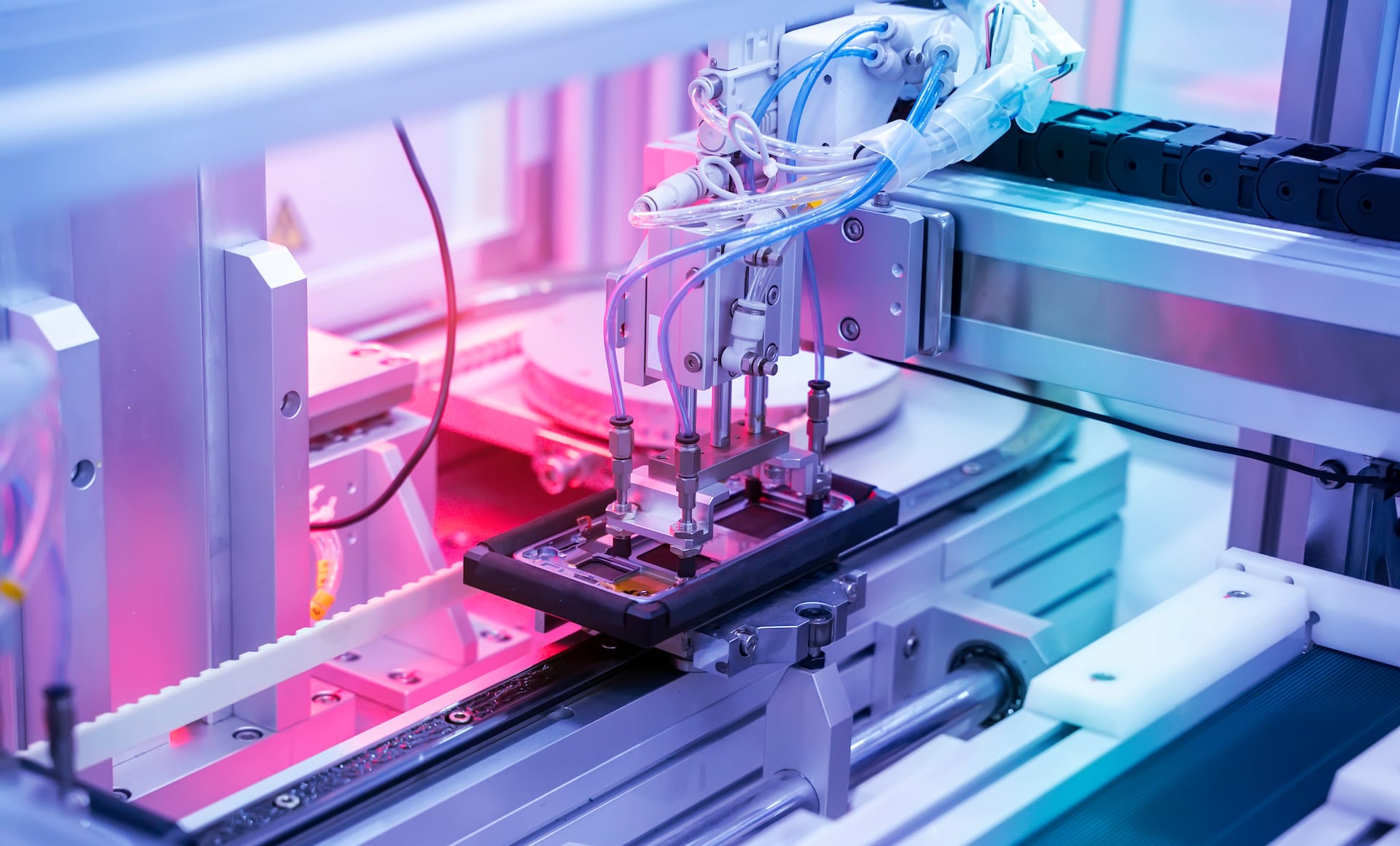
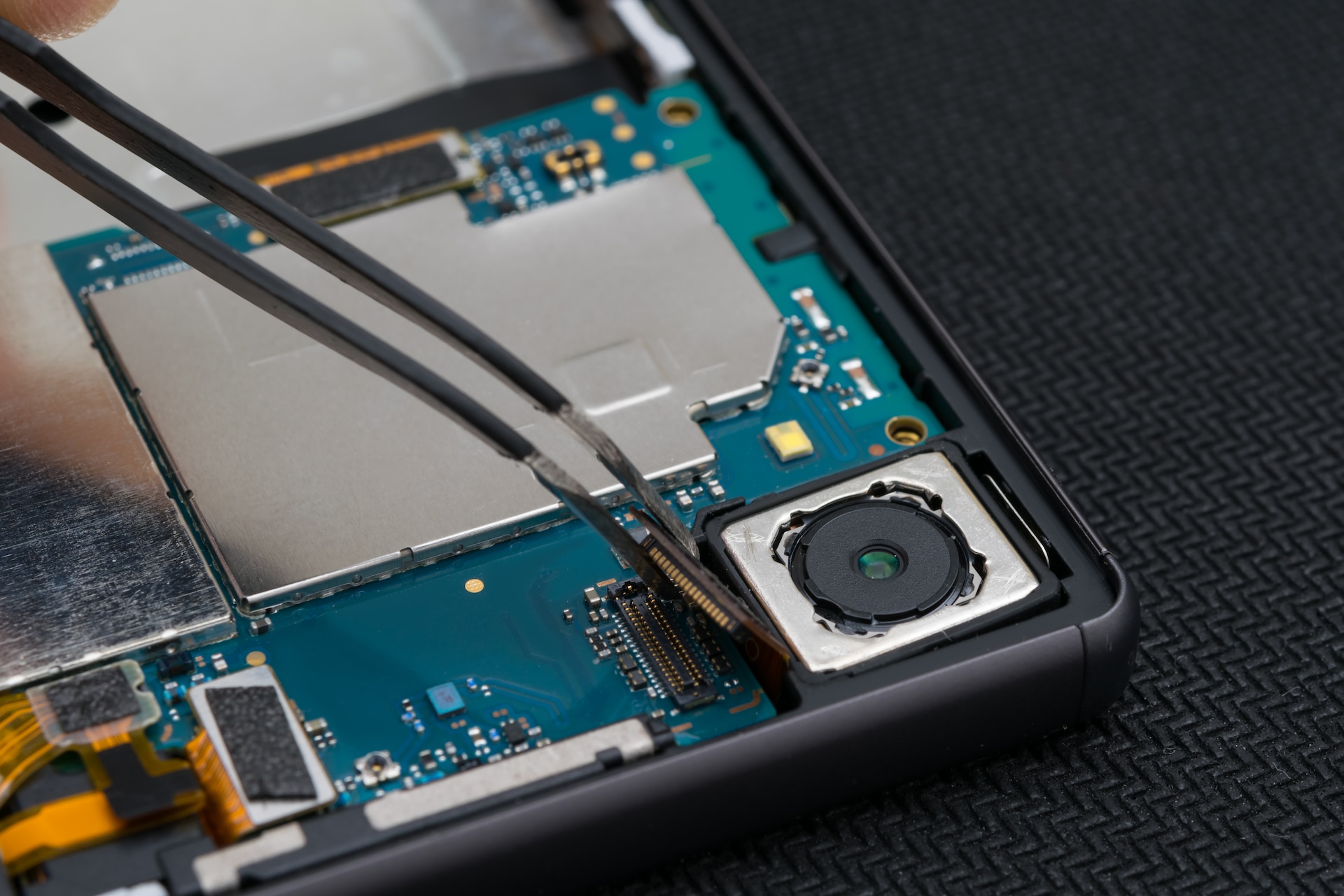
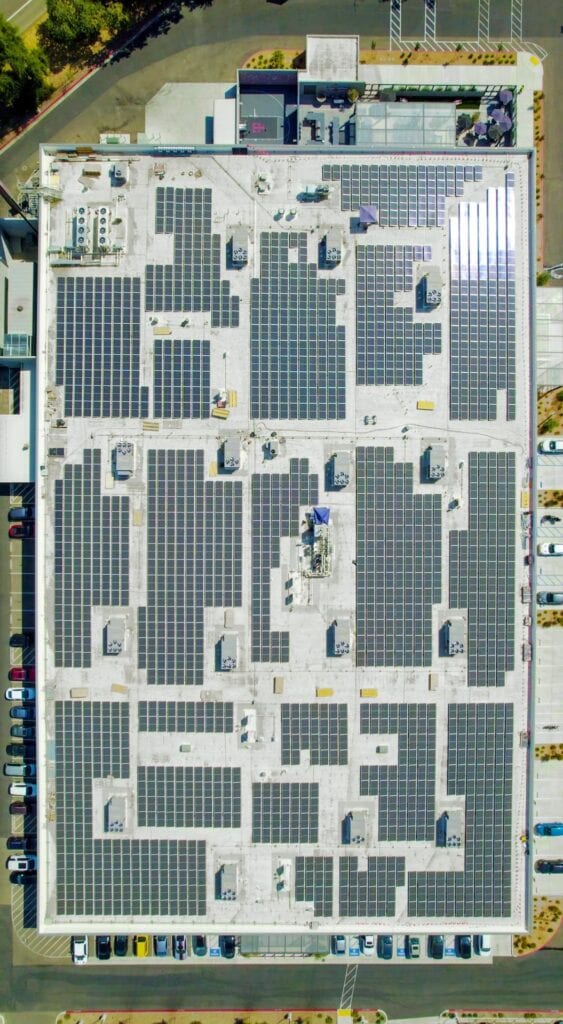


A Headquarters Ahead of the Curve
A Headquarters

Ahead of the Curve
Since its multi-million-dollar renovation completed in 2022, T-Mobile’s Bellevue, Washington, headquarters has become more than just a place to work — it’s a full-on experience. From airy outdoor courtyards to magenta pool tables, plush swinging chairs, and cozy lounge spaces, the campus feels more like a vibrant, multi-sensory escape from the ordinary 9 to 5.
Over here an airstream is serving fro-yo, and over there coworkers gather in comfortable private rooms next to a grand wooden staircase. Ample windows welcome sunshine after a cloud cover has cleared off, offering a pristine view of the mountains seen in the distance over Seattle, all while a vibrant buzz of employees greeting each other rings from the contactless elevators.
It’s hard not to notice these visual delights. But Scott Woodrome, Director of Facilities Management and Experience at T-Mobile, says people might overlook just how much the company’s sustainability mindset contributes to the campus experience.
“We’re in the third inning of our sustainability journey, and it shows in so many ways,” Woodrome says. “Two years ago, it wasn’t on everyone’s radar quite the way it is now and we are making decade-long plans to achieve bold goals. It’s part of everything we do.”
Woodrome says his job has many facets that include more than just the basic operational side of building management and safety protocols.
“Our world includes everything from ensuring the lighting, plumbing and HVACs are working properly to also running the mail rooms and the ‘Lunch on Us’ programs efficiently in our beautiful food halls that offer options for all,” says Woodrome. “We also work to have the most sustainable waste management and commuter programs for employees as well as incident management systems that send out texts to our employees when extreme weather hits.”

We’re in the third inning of our sustainability journey.
Scott Woodrome, T-Mobile Director of
Facilities Management & experience
It’s all part of what Woodrome calls a deeply intentional environment that prioritizes sustainability and employee wellbeing. From the moment employees arrive at Bellevue HQ, they encounter the impact of that mindset.
For example, when Woodrome arrives on campus and enters the garage, sprinkled with lights from occupancy sensors, he says he eyes the bike lockers available for employees traveling across Lake Washington or nearby towns. He sees the 36 Level 2 electric vehicle charging ports, which helped Washington state avoid approximately 520,917 pounds of CO₂ emissions in 2024. That’s the equivalent of nearly 589,000 fewer miles driven in a gas-powered car — or taking more than 89 round-trip drives between Seattle and Miami off the road. It’s also like removing over 51 gas-powered cars from the road for an entire year. As Woodrome walks out of the garage towards a main courtyard, he notices one of three Magenta Express buses, a free shuttle equipped with Wi-Fi that transports 150 employees daily from key public transit hubs in Seattle and Bellevue.
“The team always makes note of how sustainability plays a huge role in a great workplace experience while contributing to a greener future,” says Woodrome. “Our commuter programs can make getting to work easier, more affordable and eco-friendly, which reduces stress and supports a better work-life balance.”
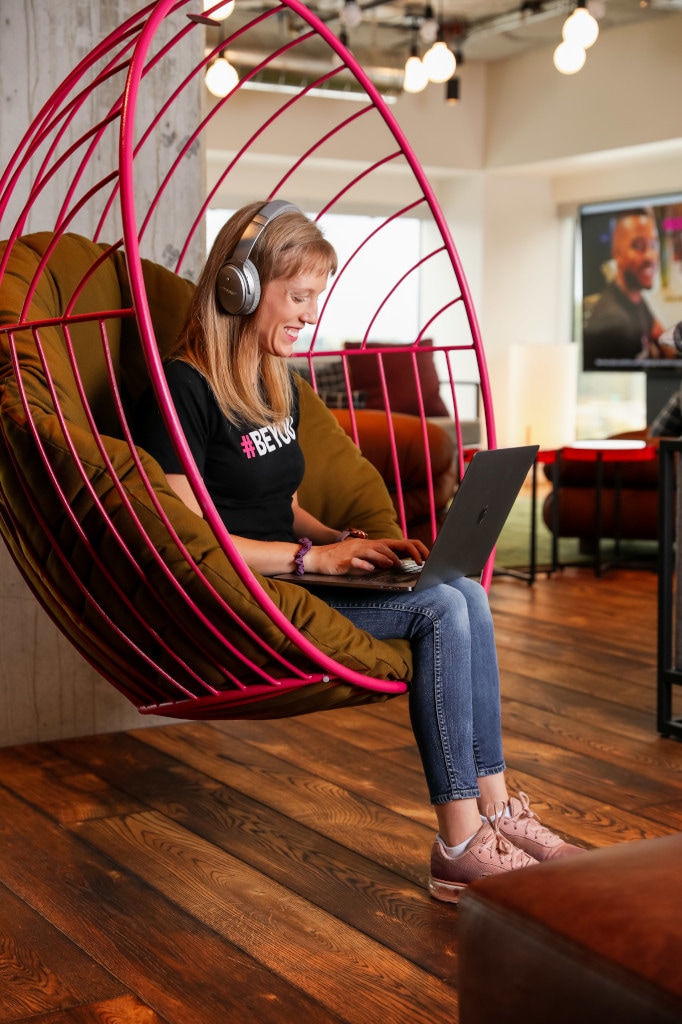
In addition to the EV chargers and carpool subsidies, there are also transit benefits across the country, such as free public transportation passes for buses and trains like the Orca Cards that 2,851 full-time Seattle-area employees used in 2024, as well as an EcoPass Program for full-time employees at the Denver McGregor office, and the Edenred Commuter Benefits Program for employees in Downers Grove, Illinois; Herndon, Virginia; Parsippany, New Jersey; and throughout New York.
“When I walk into a building at our Bellevue HQ, from floor to ceiling, even behind the walls, I’m seeing how my team has made an impact,” says Woodrome. “Our smart LED lighting that automatically dims is one of many things that people might overlook, but it is a significant savings of energy.”
Woodrome says he makes sure to glance at the WELL Health-Safety signs on the building doors. Sixty-one T-Mobile locations have been awarded the prestigious rating for spaces that prioritize health, safety and wellbeing through rigorous cleaning standings, air and water quality management, emergency preparedness, and other wellness-focused strategies. For T-Mobile, this achievement impacts the almost 30,000 people occupying these facilities.
“We have a building management system that controls our HVAC with general occupancy norms, so beginning at 6 p.m., for example, instead of having a range of 70 to 74 degrees, it’s going to slide down several degrees overnight,” Woodrome says. “We’re looking to get even better at HVAC optimization. We’re in the market for software that will coordinate settings to match the needs of the exact number of people in a specific space at any given time without wasting energy.”
T-Mobile Saved
8.9M lbs of Paper
from Landfills in 2024
No matter what floor he visits, Woodrome says he always will notice the paper recycling bins — his team’s work to partner with Iron Mountain Shredding helped T-Mobile save 8.9 million pounds of paper from landfill, conserved 37.18 cubic yards of landfill space, saved 8.5 million gallons of water, avoided 46.5 million pounds of CO2, and preserved 107,490 trees in 2024. Eighty-six percent of T-Mobile’s sites include recycling as of last year and 56% have compost programs based on building square footage. At Bellevue HQ alone, composting diverted 77% of waste from landfill, and Woodrome aims to raise that number to 82% by the end of 2025.
Woodrome says when he fills his thermos at a water refill station at either the Bellevue or Overland Park HQs, complete with sparkling and flavor options, he’s reminded that this team project helped T-Mobile save 770,706 water bottles in 2024 at the drinking fountains of multiple facilities across the country — including 413,293 water bottles saved at Bellevue HQ alone.
As he badges into his designated floor at the contactless elevator and takes a seat at his desk, he often glances at the rugs lining the expansive spaces. He says it gives him pride to think of the work his colleagues did alongside the procurement team to source such a unique recycled item — and how vibrant its magenta looks.
With the T-Mobile mantra of doing well by doing good infused throughout the work teams across the company do, Woodrome believes making a real impact has always been the plan.
“It’s the right thing to do,” says Woodrome, “and our employees expect it.”
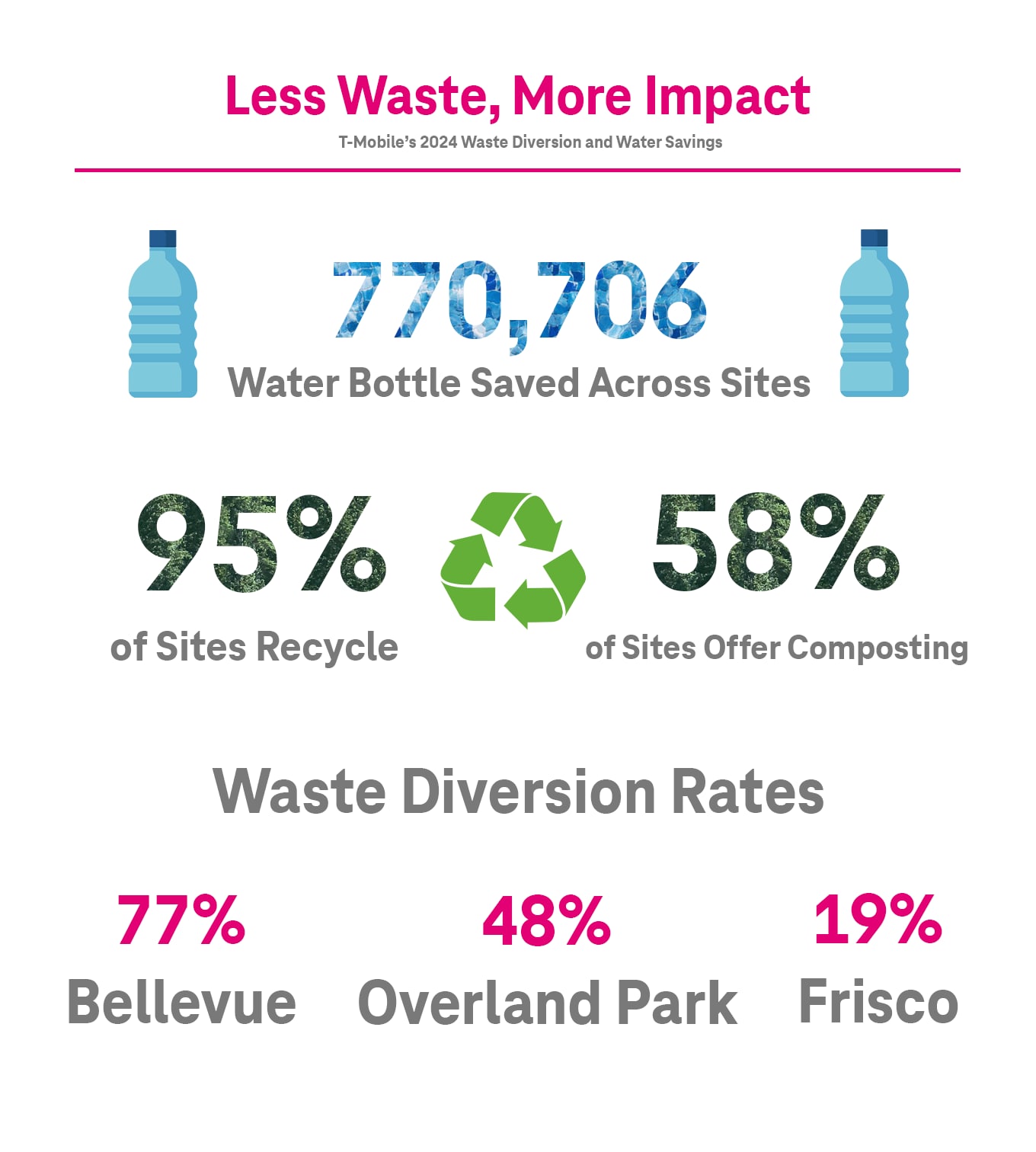

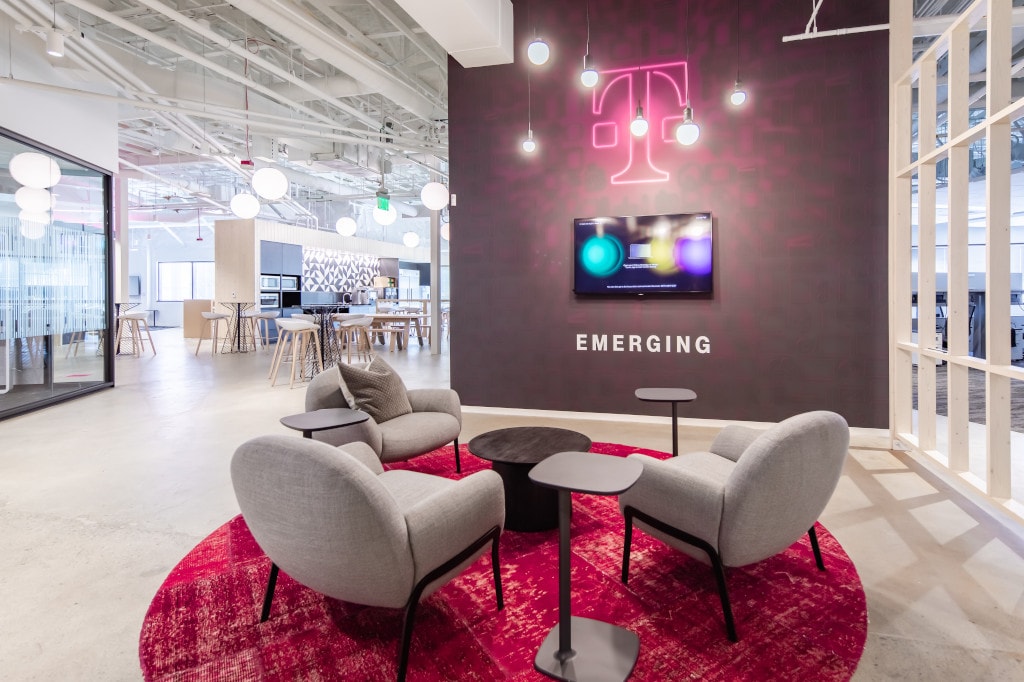
Harnessing the Sun at Kingsburg
Harnessing the Sun
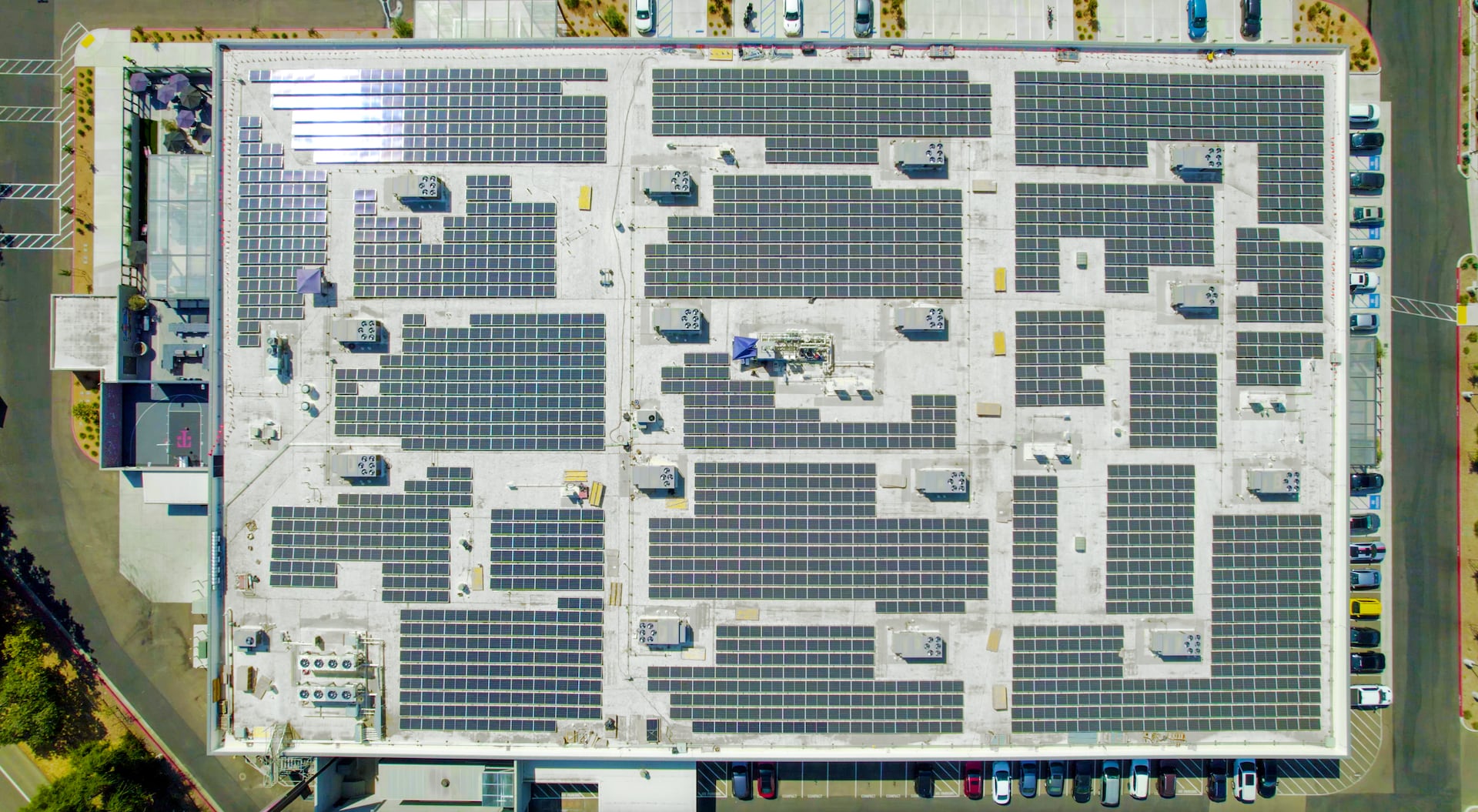
at Kingsburg
While the Bellevue HQ showcases features designed to support employee well-being and innovation, one of T-Mobile’s newest Customer Experience Centers — nearly 1,000 miles away in sun-drenched California — is making a different kind of impact.
At the CEC in Kingsburg, T-Mobile is harnessing the power of solar energy at an astounding scale. Solar panels supply around 75% of the impressive 86,729-square-foot facility’s electricity needs. As a result, the center is key to T-Mobile’s progress towards net-zero emissions.
“It’s just amazing to see how one facility can play such a crucial role in the company’s overall sustainability strategy,” says Maria Jimenez, the CEC’s Director.
Jimenez, who became Director in 2024, also felt a sense of alignment with the company’s environmental goals when she stepped into the CEC.
“Sustainability goes far beyond just what’s happening here,” she says. “This facility can hold over 1,000 employees, and I think people always want to know how they’re contributing to a bigger cause. Professionally as a leader, and personally as a mother to two daughters, it’s about making conscious choices to help reduce impact on our planet.”
As of Dec. 31, 2023, T-Mobile is powering its operations with 100% renewable electricity — a milestone that reflects both environmental responsibility and the company’s strategy to support scalable, sustainable growth as it works toward net-zero emissions by 2040.
It’s a complex process to achieve this goal. It starts with purchasing electricity from the U.S. electric grid, which is powered by a variety of energy sources including solar, wind and other renewables. These renewables are tracked by so-called Renewable Energy Certificates (RECs). T-Mobile has built a strong renewable energy base using these RECs by investing in a number of projects such as wind and solar-powered sites.
The company has been growing its investment in CEC solar projects across the country with the help of Redaptive, an organization that decarbonizes real estate by supplying data and resources to install energy generating and energy saving equipment including solar power upgrades at scale. The company helped install the solar panels not only in Kingsburg, but also at T-Mobile CECs in Rochester, New York; Albuquerque, New Mexico; and Las Vegas.
After completion, Redaptive’s CEO Arvin Vohra says these locations will have a combined system size of 2,600 kWh, which will lead to a 4.3 million kWh of solar production annually. In other words, the electricity produced will avoid 18,132 metric tons of CO2 emissions over the next 15 years, which is the equivalent to emissions from 3,673 homes.
“The electricity produced by the solar panels on T-Mobile’s CECs will avoid 18,132 metric tons of CO2 emissions over the next 15 years, which is the equivalent to removing 43,899 barrels of oil or the emissions from 3,673 homes.”
ARVIN VOHRA, CEO OF REDAPTIVE
Redaptive has helped many of the Fortune 500 companies meet their sustainability goals, but Vohra says T-Mobile stood out with its upfront vetting and intentional goal setting the moment the two organizations met seven years ago.
“There’s an upper echelon of companies that have looked into this and that have done something about it,” says Vohra. “T-Mobile is certainly, from the renewable procurement side, at the cutting edge.”
He says the deliberate process of creating a roadmap towards cleaner energy production from a wide range of real estate across the country also set T-Mobile apart from other clients.
“Hearing some of T-Mobile’s already achieved goals, I’m undeniably impressed. It’s a very complicated process to actually procure 100% of renewable energy, particularly when you have a such a widely distributed footprint,” says Vohra. “What you’re really doing is you’re buying solar power and wind power from different places, and T-Mobile was able to successfully stitch that strategy together to craft its carbon neutrality objective.”
After announcing its goal of achieving net zero emissions by 2040, T-Mobile has cut its total carbon emissions by 33% (using market-based Scope 2 emission figures and excluding Scope 3 indirect use-phase emissions). This comes largely in part by using more renewable sources and improving energy efficiencies.
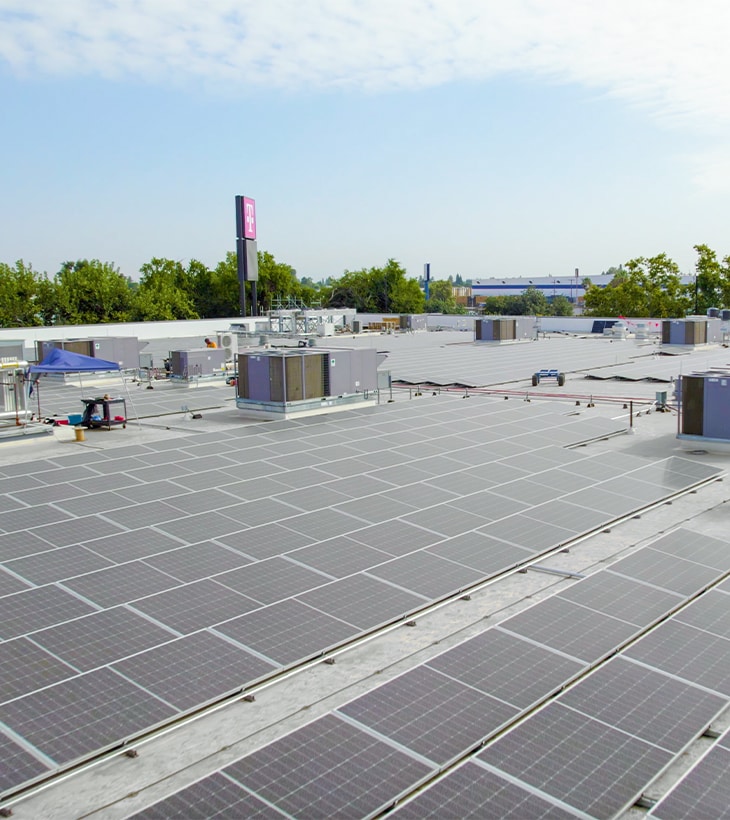
Solar Panels Supply Approximately
75%
of the 86,729-square-foot Kingsburg CEC’s Electricity Needs
Vohra says that while he’s heard all kinds of bold sustainability goals since his company was founded in 2015, T-Mobile’s success metrics are hard to ignore.
“It matters because we see companies that are pushing out those deadlines,” says Vohra. “Meanwhile, T-Mobile has already made major headway.”
At the Kingsburg facility, Vohra says Redaptive installed 1,385 540W panels that generate a power output of 693kW AC with an annual production of 1176MWh. For context, imagine that if there are approximately 1,000 employees on site, the energy created is the same as if every employee outfitted a single-family home with solar panels — times four.
It’s this kind of impact that Jimenez says empowers her and the Kingsburg CEC employees.
“When it comes to the efforts that we’re doing internally for our people and for our consumers,” she says, “it’s always front of mind to show transparency and ensure we’re doing things the right way.”
The Power of Reverse Logistics
The Power of
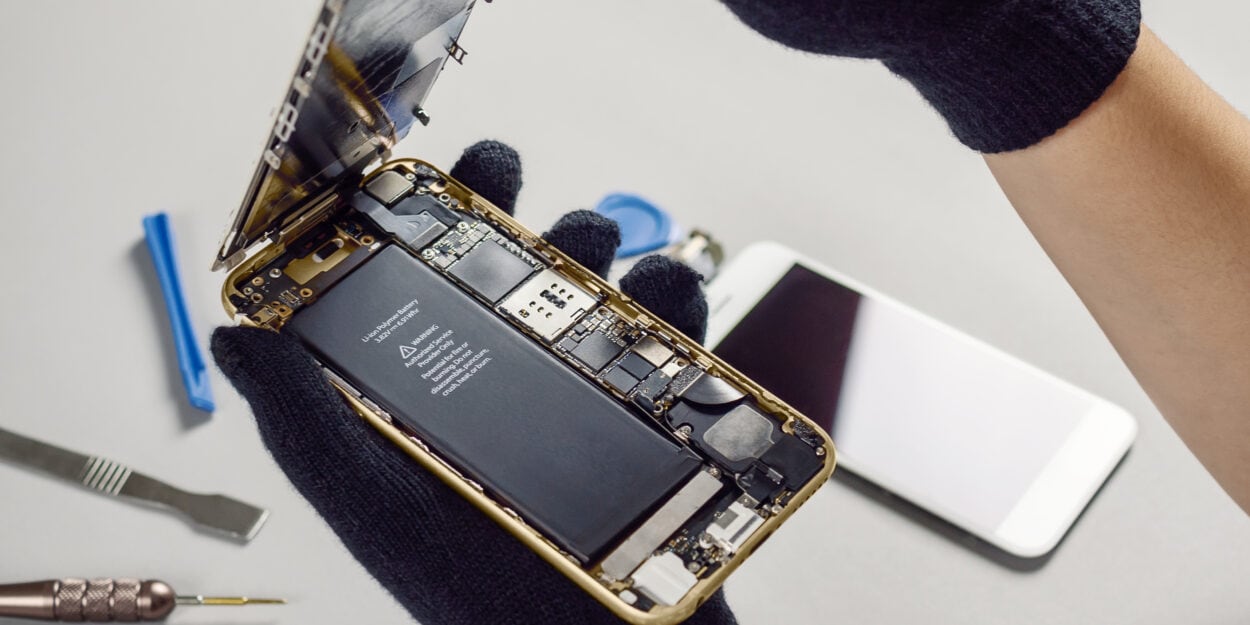
Reverse Logistics
Over 1,500 miles from the Kingsburg CEC, in Texas, sustainability takes shape in the form of used phones being given a second life.
T-Mobile’s Reverse Logistics facility in Dallas plays a vital role in the company’s circular economy strategy and has a long-standing commitment to sustainability.
Rusty Johnson, Senior Director of Reverse Operations and Partner Management, brings 20 years of experience in the field of reverse logistics. His team oversees the refurbishment, repair, and recycling of returned devices — and their work was spotlighted in T-Mobile’s latest Corporate Responsibility Report. In 2024 alone, the company prevented 11 million used devices from ending up in landfills.
“The reverse logistics team builds and manages a vendor network that delivers post-sale processes and support for devices, accessories, and home internet products,” Johnson explains. “By repairing and refurbishing products, fewer items are discarded, reducing both waste and the greenhouse gas emissions that would result from their decomposition.”
Johnson notes this effort is an important contributor to one of T-Mobile’s biggest sustainability milestones: reducing the company’s overall carbon footprint by 14% in 2023 alone.

By minimizing waste we’re also reducing the need to mine for precious metals found in devices such as gold, palladium, nickel and copper.
Rusty Johnson, T-Mobile's Senior Director of
Reverse Operations and Partner Management
Over the years, Johnson’s team has built a system rooted in exceptional efficiency. In October 2024 alone, the facility received around 1 million devices, which were processed for resale through steps such as reconciling, triaging, repairing and re-kitting. With the help of new automation tools, most devices are ready for reuse within just 7 to 12 days. Impressively, 97% of them are certified by UL ECOLOGO and EPEAT— ensuring the products meet rigorous third-party environmental standards through comprehensive testing and auditing.
“I’m glad to see such a strong, company-wide focus on something we’ve taken seriously in the reverse logistics team for more than two decades,” says Johnson. “Currently, 97% of all the devices we handle can be reused instead of ending up in landfills — which also means less need to mine the valuable materials they’re made from — like gold, palladium, nickel, and copper.”
Across T-Mobile, this commitment to sustainability fuels a sense of purpose. Johnson says it motivates his team, renews their passion for the work they’ve long championed, and inspires them to strive for even greater impact moving forward.
Looking ahead, T-Mobile is focused on managing its environmental footprint in ways that drive efficient, sustainable business growth — all while empowering the people behind that progress. Whether through smarter commuting options, more efficient facilities or forward-thinking device reuse strategies, the company continues to embed innovation into how it operates — proving that long-term resilience starts with everyday actions.
At T-Mobile, doing good isn’t just a mission — it’s a mindset.
*33% Reduction in total Scope 1, 2, and 3 emissions since 2020 using market-based Scope 2 emission figures and excluding Scope 3 indirect use-phase emissions.100% Renewable Electricity: T-Mobile matches its own annual electrical usage with renewable energy from a portfolio of sources including: virtual power purchase agreements, a green direct program, renewable retail agreements, community solar agreements, and unbundled REC purchases.
Glossary
- kW AC (Kilowatt Alternating Current): A unit measuring the power output of a solar system. It reflects the electricity available for use in homes or facilities.
- RECs (Renewable Energy Certificates): Tradable credits that prove one megawatt-hour (MWh) of electricity was generated from a renewable energy source. Companies use RECs to track and verify their renewable energy use.
- LEED (Leadership in Energy and Environmental Design): A green building certification program used worldwide.
- WELL Health-Safety Rating: A certification focused on operational policies and maintenance protocols that support human health and well-being.
- Waste Diversion Rate: The percentage of total waste that is not sent to landfill, typically through recycling, composting or reuse.
